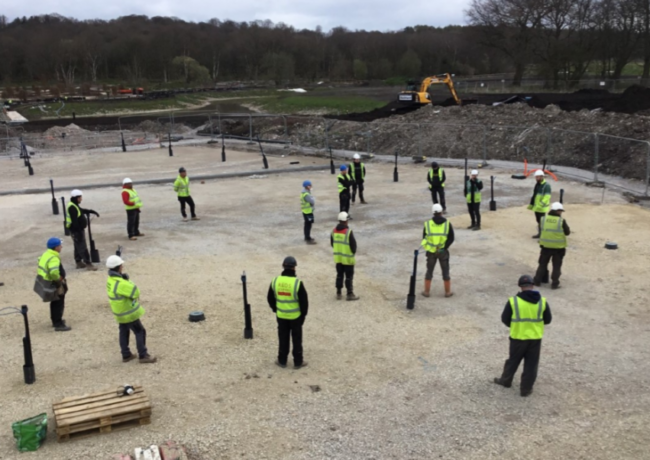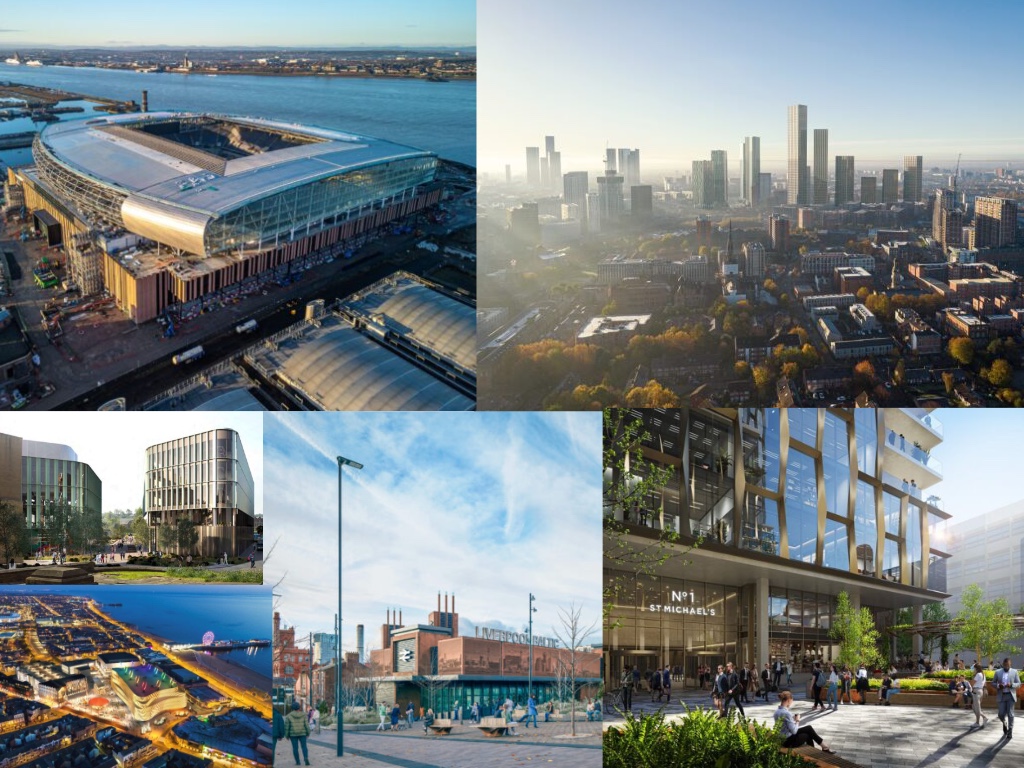Construction firms adapt to weather Covid-19
Developers and contractors have changed habits and adopted new practices to ensure that work can continue during lockdown and, by proving they can work safely in line with Government guidelines, have restored some industry momentum.
In the North West and beyond, firms are pulling together to come up with ideas on how to overcome challenges related to social distancing requirements on construction sites, while tricks of the trade and short video clips are being shared with the community to demonstrate solutions.
In the North West, Seddon Construction is working to allay employees’ health fears and is using its contacts to do so.
A friend of one of the firm’s owners runs Macpac, a plastics manufacturer in Stockport that is making protective visors that can be clipped onto hard hats. Bolton-based Seddon is due to receive its first delivery of visors next week.
“The most important thing to do now is make sure people feel safe,” Peter Jackson, managing director at Seddon Construction, told Place North West.
“[The visors] give protection against airborne particles and we think they will give people a lot more confidence. There are a lot of little things that people are coming up with that are ingenious and innovative.”
Fresh solutions
Many of the solutions are simple, according to John Wilson, managing director at Preston-based Eric Wright Construction.
“A lot of it is not rocket science,” he said. “We are opening sites early and staggering starts so we don’t get the bottleneck in the morning.
“We have created outside dining areas and outside washrooms and put toilet attendants on doors to limit the number of people using the toilets at one time, like in a nightclub. It’s about putting in place simple rules that people can follow and stick to.”
Bam Construction has also implemented new ways of adhering to Government guidelines and protecting the safety of its workers.
Ian Fleming, regional director for the North West at Bam, said measures include holding team meetings outside, closing off “every other” toilet cubicle, and providing “additional inductions and ‘toolbox talks’ to ensure the new guidelines are explained and understood.”
Many kinds of solutions and workarounds are logical but others require a degree of opportunism, Eric Wright’s Wilson said.
“At the start [of lockdown], when sites were closing, there were certain types of tradesmen that could work and still wanted to work so we re-sequenced some of our [project timelines] to allow those people to work on our sites safely,” he told Place North West.
“We have got a residential project in Manchester with 150 kitchens and 150 bathrooms to tile so we put a tiler in each kitchen and instead of it taking weeks and weeks it got done in about 10 days.”
Adaptability has been key to maintaining momentum in recent weeks but changing hardwired routines has not been easy, industry practitioners added.
Jackson said: “Workers are trying to come to terms quickly with site operating procedures, which means they have to rethink everything they have done and apply something completely new.
“They have never had to deal with change of that magnitude so quickly before, and I think some people have found that difficult.”
Despite the work being done to adhere to social distancing rules some are not convinced about the practicality of it.
Place North West received an email from the wife of a Renaker employee who said that the developer’s decision to reopen sites was a case of “profits over people” and questioned whether a project to build luxury apartments could be considered essential.
The email said: “[Renaker]has new procedures in place on site that state all works to be carried out with social distancing of two metres where practically possible, from my husbands experience on site this is impossible in practice.
Materials shortages
The reopening of sites is a point of contention for some and, several weeks ago, many in the industry believed construction would shut down completely, as it did in Scotland, until the Government stepped in to relax certain restrictions, initially to allow construction of emergency Covid-19 hospitals to go ahead.
Wilson and Jackson said they thought that some suppliers and manufacturers “jumped the gun” and shut down operations too early, which has left contractors facing shortages of certain building materials.
Jackson said: “People panicked, and I think those ones that paused and took a couple of days to think about it are now better placed than those who stopped.”
Seddon has furloughed 400 staff but remains operational on around a quarter of its sites, most of which are related to healthcare and the NHS. However, these various breaks in the supply chain are likely to impact the small pockets of ongoing construction activity.
Jackson said: “Even the manufacture of bricks and blocks has stopped. We are getting them from the yards at the moment but sooner or later they are going to have to replenish those stocks and for that, the manufacture has got to restart [production].
“Getting products is a challenge right now, but we are soldiering on and getting through.”
Wilson says that his company, whose civil engineeering arm has restarted work at Pooley Bridge this week, is reacting differently to how it has done before in order to deal with issues brought about by the pandemic.
“One of our mortar suppliers closed,” he said. “We are now using a different type of mortar and have decided to just tint the brickwork afterwards. It’s another operation but because the brickwork is on the critical path, we decided to keep going.
“We do have common materials on other sites so we can rob Peter to pay Paul. On one particular site we have got a load of acoustics material that is required more urgently on another site, so we have moved it. By the time we need it on the first site we are hoping the factory will have reopened.”
Bam has also run into difficulties in terms of the supply of certain materials. “We are dealing with material shortages generally such as plasterboard materials or quarried materials such as gravel and stone,” Fleming said.
“We are looking at alternative products to keep the work moving or just not doing that type of work until the materials become available again.”
Looking ahead
As firms continue to fight their way through the pandemic with a combination of determination and ingenuity, Jackson expressed concerns for the construction industry as a whole, especially with regard the impact on smaller contractors, which, with smaller profit margins and reduced cashflow, could become victims of the pandemic.
“A bigger company like ourselves that has cash reserves and a decent balance sheet can probably ride out a few months, but for smaller businesses, I don’t know how they are doing it,” he said.
“If a sub-contractor does go bump, the implications of replacing them on a project costs a lot of money and that will impact the main contractor.
“We really are all in this together.”






